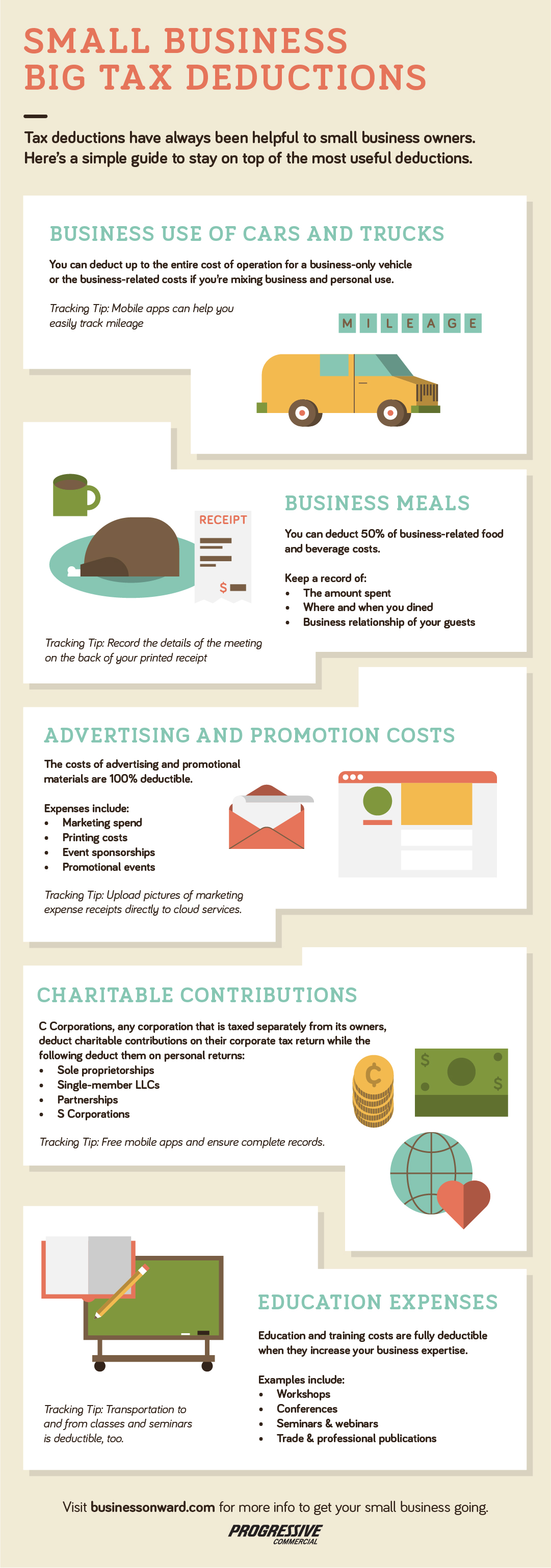Small Business Big Tax Deductions: The Simple Guide
For each deduction, we provide a brief description of the benefit, as well as a tip that provides quick advice on the simple ways to keep track of the specific deduction.
Visually, we recommend that each deduction is supported with a relevant image — for instance, a graphic of a plate of food or a dinner related image, an image of a stack of business cards for advertising promotional expenses.
Small business tax deductions: The simple guide
With all the demands and distractions of running a small business, it’s easy to lose focus on tracking and fully leveraging tax deductions. Yet that can end up being a costly mistake.
Tax deductions have always been the small business owner’s friend — and the recent Tax Cuts and Jobs Act has created even more opportunities for small business owners with a range of new tax deductions rules.
Here’s a simple guide to help you stay on top of the key small business tax deductions:
Business use of cars and trucks
Whether you’re a road warrior or just zipping around town to serve clients, you can deduct the business use of your vehicles. Deduct the entire cost of operation for a business-only vehicle and deduct for business-related costs if you’re mixing business and personal use.
- Tracking tip: Apps such as Stride Tax, MileIQ or Simple can help you easily track mileage.
Business meals
You can deduct 50% of qualifying food and beverage costs. Remember, the meal must be business related, and you need to record the amount spent, where and when you ate and the business relationship of the person you dined with.
- Tracking tip: Right after you get the check, write the purpose of the meal and the person you dined with on the back of receipt.
Advertising and promotion
The cost of advertising and promotion is 100% deductible. Expenses include spending for marketing and advertising, as well as the cost of printing business cards or event sponsorships and promotional events.
- Tracking tip: Upload pictures of receipts of promotional expenses or other day-to-day business purchases to cloud services such as Shoeboxed, Expensify or Neat that organize them into a personalized online database.
Charitable contributions
Make the most of doing good in your community. Sole proprietorships, single-member LLCs, partnerships, and S corporations can all deduct charitable contributions on their personal tax return, while corporations deduct them on their corporate tax return.
- Tracking tip: Free apps such as ItsDeductible and Donation Assistant make tracking your charitable donations easy and ensure you have good records at the end of the year.
Education expenses
Education and training costs are fully deductible when they increase your expertise or add value to your business. Examples include seminars and webinars, workshops and conferences to increase your knowledge and skills, as well as transportation to and from classes or seminars.
- Tracking tip: Use your dedicated business credit card for subscriptions to trade or professional publications and magazines. Your card statement provides an ongoing record of these deductible expenses.
This information is provided for informational purposes, may not be applicable to all situations, and is not intended to provide legal, tax, or financial advice. For specific advice about your unique circumstances, you may wish to consult a qualified professional.
